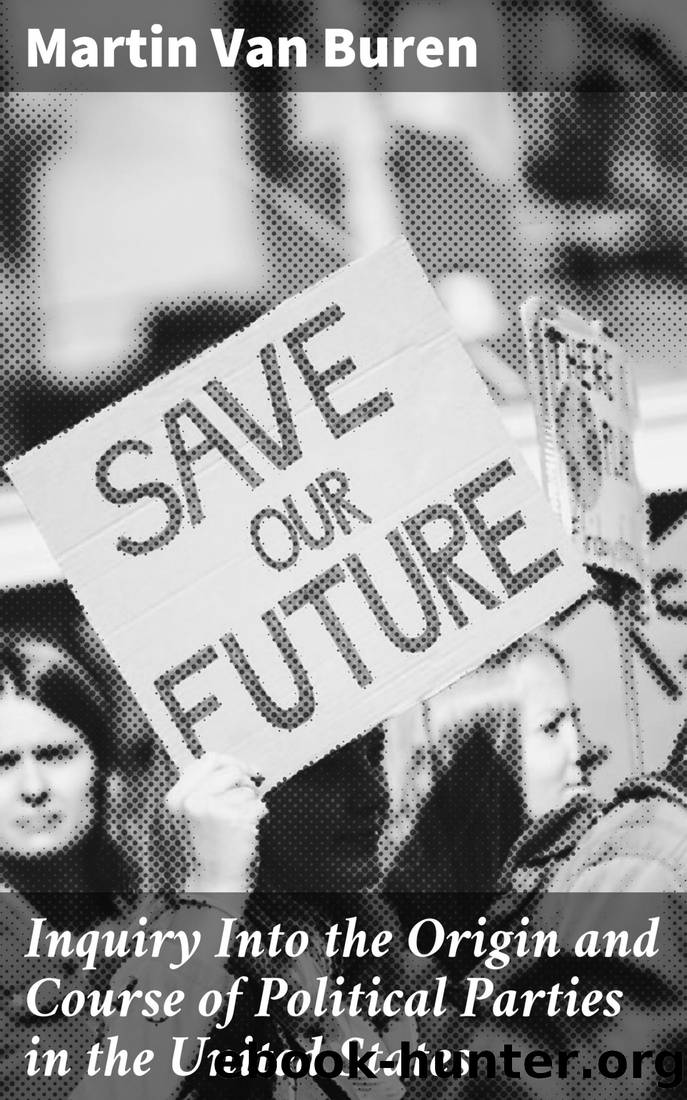Inquiry Into the Origin and Course of Political Parties in the United States by Martin Van Buren

Author:Martin Van Buren [Buren, Martin Van]
Language: eng
Format: epub
Tags: Nonfiction, Reference & Language, Reference, Fiction & Literature, Classics
ISBN: 4064066172848
Goodreads: 26604029
Publisher: Good Press
Published: 2019-12-17T05:00:00+00:00
Other instances have occurred in our Government and elsewhere in which statesmen have transcended the constitutional limits of their power under a necessity sincerely believed to be controlling, trusting to that circumstance for the indulgence of their constituents; and in no case which has presented itself here has that indulgence been withheld where the motives for the assumption of responsibility were pure. Mr. Jefferson's course in the purchase of Louisiana and General Jackson's conduct at New Orleans were striking cases of that description.
But we have, fortunately, evidence the most authentic and unequivocal that President Washington never intended by his approval of the Bank Bill to express an approval of the systematic and general disregard of the intentions of the framers of the Constitution, in respect to the powers of Congress, whenever such disregard should be deemed expedient. The provisions of the first Apportionment Bill sent to him for his approval were contrary to the Constitution, and Mr. Jefferson gave an opinion to that effect and recommending a veto, whilst the opinion of General Hamilton was in favor of their constitutionality. The division by which the bill passed had been exclusively sectional, and the objection of unconstitutionality was raised by the South. The Union was, at that early period, believed to stand upon a precarious footing, and the President was seriously apprehensive that the worst consequences might result, in the then state of the public mind, if he were to throw himself on the side of his own section by a veto.
His embarrassment and concern were great, and he was sincerely desirous to avoid a resort to what was then regarded as an extreme measure. He agreed that the method prescribed by the bill "was contrary to the common understanding of that instrument (the Constitution), and to what was understood at the time by the makers of it," but thought "it would bear the construction assumed by the bill." This was the precise issue that was raised upon the passage of the bill to establish the bank, viz.: whether the actual intention, or that which was only inferential, was to prevail. That he would have withheld the veto if he had felt himself at liberty in such a case to follow the letter of the Constitution, and thereby defeat the intention of those who made it, no one, who examines the matter, will for a moment doubt. He appears to have been duly sensible of the magnitude of the question in all its bearings. On the one hand were the evils to be apprehended from a decision in favor of the South upon a disturbing question by a Southern President, in a form not only without precedent here, but very unpalatableâthat of a veto; on the other was the grave objection to his committing himself in favor of the principle which had prevailed on the question of the bank in a case that did not furnish any thing like an equal excuse for departing from the honest and straightforward rule of interpreting the Constitution, like any other instrument, by the intention of those who made it.
Download
This site does not store any files on its server. We only index and link to content provided by other sites. Please contact the content providers to delete copyright contents if any and email us, we'll remove relevant links or contents immediately.
The Evolution of an Empire: A Brief Historical Sketch of France by Mary Platt Parmele(439)
An Introduction to the Philosophy of Law by Unknown(341)
Astounding Stories, August, 1931 by Various Authors(329)
B-12's Moon Glow by Charles A. Stearns(325)
Historia Amoris by Edgar Saltus(317)
BY Arthur H. Smith, Smith A.H. by Village life in china(312)
Arsene Lupin vs. Herlock Sholmes by Maurice Leblanc(312)
The Fade Tabletop by Jeremy Harris(300)
The Scottish Fairy Book by Elizabeth W. (Elizabeth Wilson) Grierson(287)
The story of Sigurd the Volsung and the fall of the Niblungs by William Morris by Unknown(285)
The Courtship of Morrice Buckler by A. E. W. Mason(277)
The moral and intellectual diversity of races, with particular reference to their respective influence in the civil and political history of mankind from the French by Count A. De by Gobineau Arthur comte de(260)
A History of Witchcraft in England from 1558 to 1718 by Wallace Notestein(257)
Memoirs of a Veteran: Personal Incidents, Experiences and Observations by Isaac Hermann(256)
Cozy Up for Christmas by Jenny Holiday(255)
Cottage Economy, to Which is Added The Poor Man's Friend by William Cobbett(251)
Euthenics, the science of controllable environment by Ellen H. (Ellen Henrietta) Richards(247)
Folk-Tales of the Khasis by Mrs. Rafy(247)
The Black Douglas by S. R. Crockett(243)
